VCU Hispanic Student Dental Association spearheads efforts to enhance care for Hispanic/Latinx community
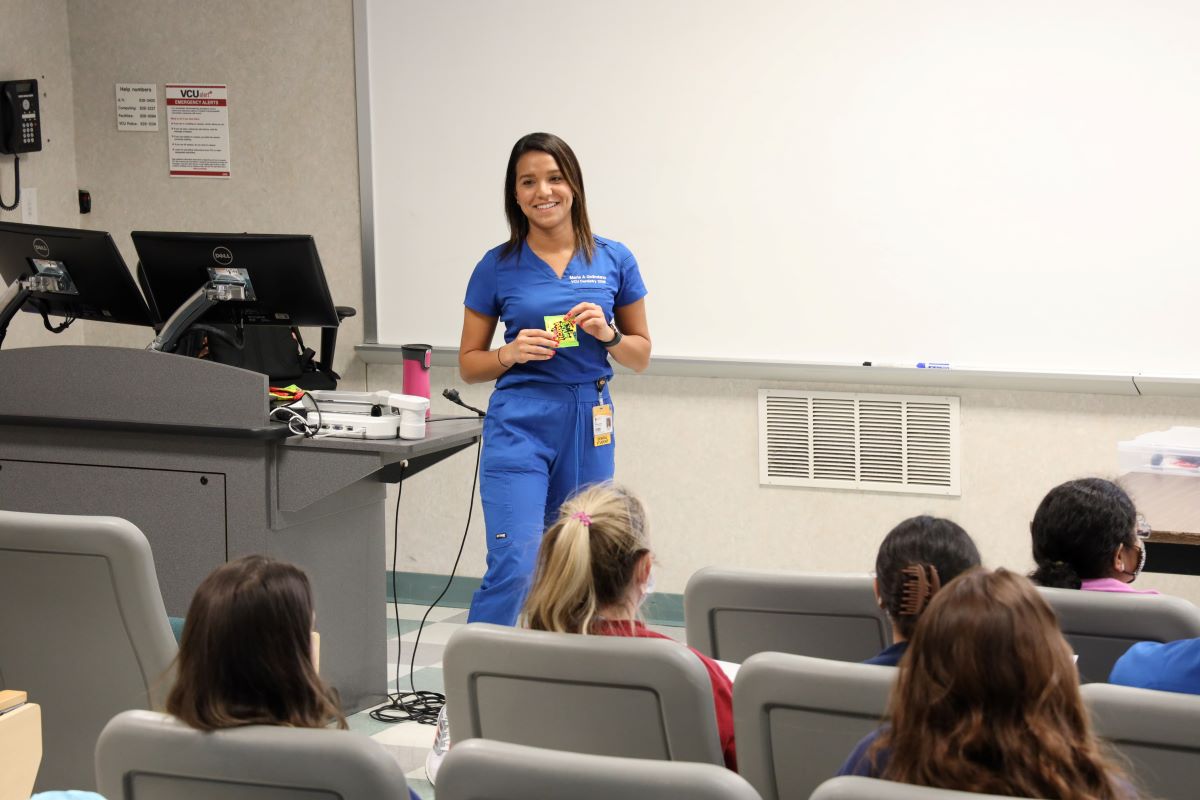
A student-run organization at VCU School of Dentistry is spearheading efforts to enhance care for the Spanish-speaking Hispanic/Latinx community, while also helping dental students, staff and faculty improve their cultural competency.
The VCU Hispanic Student Dental Association (HSDA) has 40 members, which includes students, residents, faculty and staff.
“I feel like we’re more than a club,” said Natalia Chavez Choque, a third-year dental student and the president of HSDA. “We’re more of a representation of the Hispanic/Latinx community when it comes to clinical care.”
Studies show that language and cultural barriers are huge factors in oral health disparities impacting Hispanic/Latinx communities. These barriers can lead to worse oral health outcomes, decreased patient satisfaction and increased costs for patients.
VCU School of Dentistry and VCU Dental Care are trying to minimize those barriers.
Patrice Gray, director of marketing for VCU Dental Care and director of continuing education at the School of Dentistry, says VCU Dental Care has built a strong relationship with the Hispanic/Latinx community through community engagement and targeted marketing.
She says VCU Dental Care also provides all brochures and dental forms in Spanish for the Spanish speaking community.

In addition to having several Spanish speaking staff and faculty members, VCU Dental Care provides Volatia, a language translation and interpretation service, for all patients.
Volatia supports more than 280 different languages, including American Sign Language.
In VCU Dental Care clinics, Spanish is the most used language on Volatia, but a total of 36 languages have been used so far in 2022.
“We do everything we can to provide all of our patients with the best quality of care,” said Senior Associate Dean of Clinical Education Richard Archer, D.D.S., M.S. “Volatia has worked out incredibly well, bridging some of those language and cultural barriers. In the past we struggled to treat some patients because of language barriers. With Volatia, we now have an incredible resource for all non-english speaking patients.”
Cultural competency is one of the biggest keys for growth and improvement in health outcomes and quality of care. The American Dental Education Association defines cultural competency as the awareness and ability of providers to respond to the sensibilities of patients whose cultures and values may be very different from their own.
The HSDA, led by Chavez Choque, is now shifting their focus to furthering the school’s efforts in advocating for the Hispanic/Latinx community. They are taking an organized approach to help improve care for non-english speaking patients from the Hispanic/Latinx community.
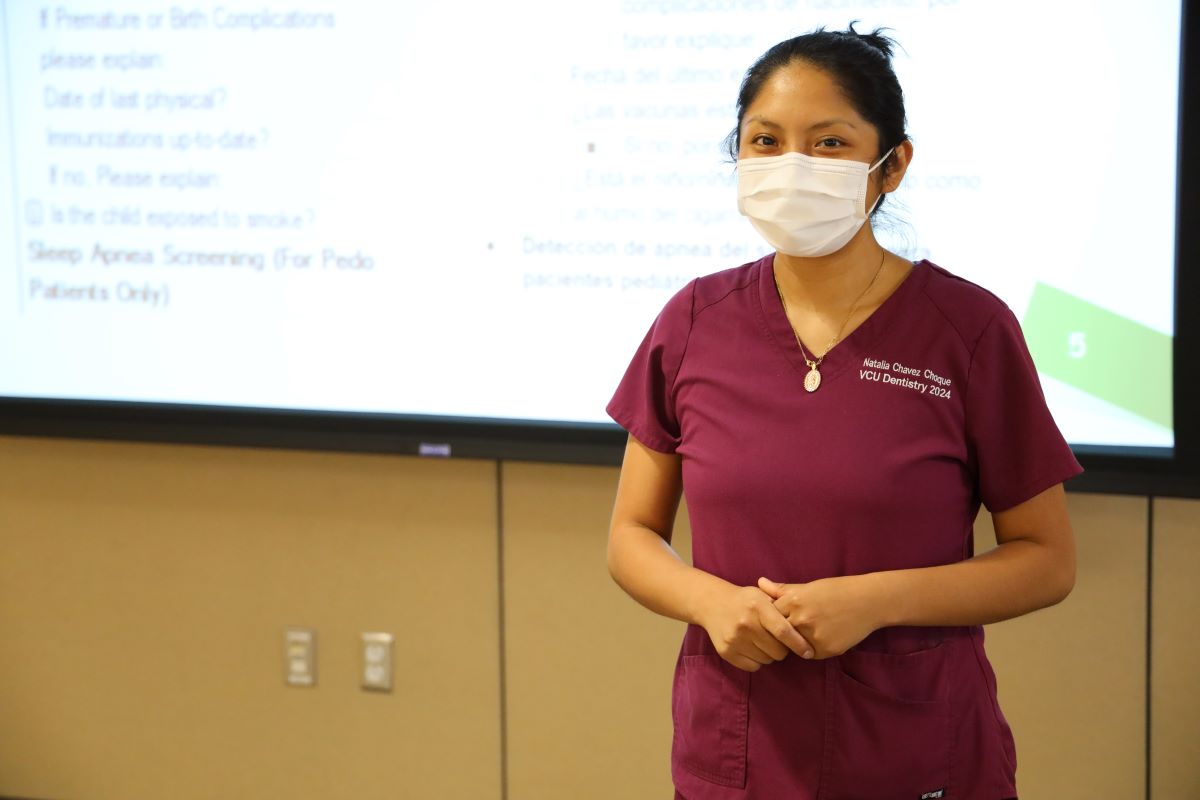
“I think it is up to us because we are the future of oral healthcare,” said Chavez Choque. “We must be able to serve any patient that comes in our doors and not being able to understand our patients prevents us from providing the best care that we can. Being a clinician that is willing to improve in every area is really important.”
After identifying areas for improvement last spring, the HSDA is now organizing their efforts to improve cultural competency by hosting a series of Dental Spanish Workshops for all VCU dental and dental hygiene students, residents, faculty, and staff members.
The launch of the workshops and a series of other events coincides with Hispanic and Latinx Heritage Month, which is annually celebrated from Sept. 15 to Oct. 15 to recognize the achievements and contributions of Hispanic Americans.
The goal of the workshops is for dental students and professionals to not only improve their Spanish but also their cultural competency as oral health practitioners.
“We are gonna try to tackle some of the things that we do in the clinic. Going through health history forms, going through dental history forms, how to properly say dental and medical terminology in Spanish,” said Chavez Choque.
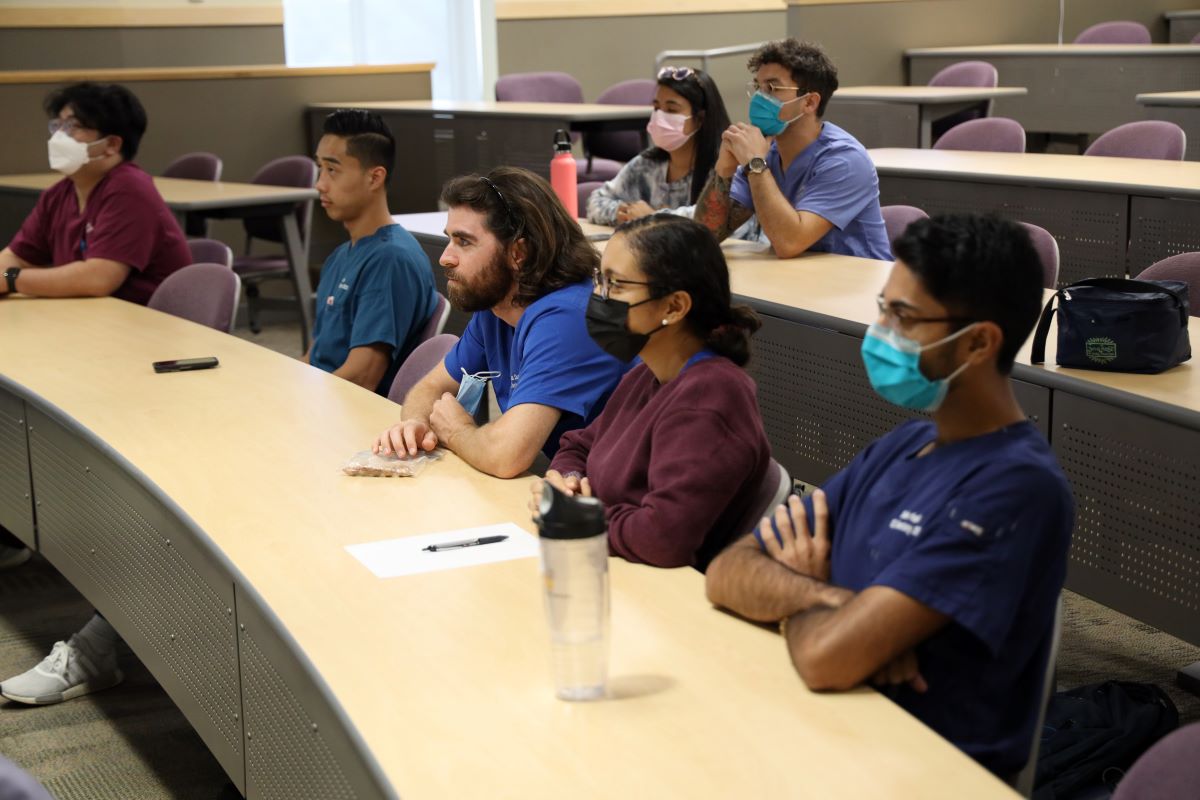
There are workshops for both beginners and advanced Spanish speakers. The first two workshops, the Basics 101 and Axium Forms – Health History, were held on Sept. 9.
VCU School of Dentistry Dean Lyndon Cooper, D.D.S., Ph.D., was one of dozens of faculty, staff and students in attendance.
“As a dental school and clinic, we have an inherent responsibility to provide all of our patients with the best quality of care and to educate our students, residents, faculty, and staff about how to best serve the needs of all patients,” Cooper said. “We support the HSDA in their mission to advocate for the oral health issues of the Hispanic/Latinx community and we are proud of our students for leading this charge.”
Maria Golindano, a first year dental student, is the chair of the Dental Spanish Workshops. She immigrated to the United States from Venezuela in 2013 after she graduated high school. Although she is new to VCU School of Dentistry, she is experienced in treating Spanish-speaking patients after working as a dental assistant in South Florida for seven years.
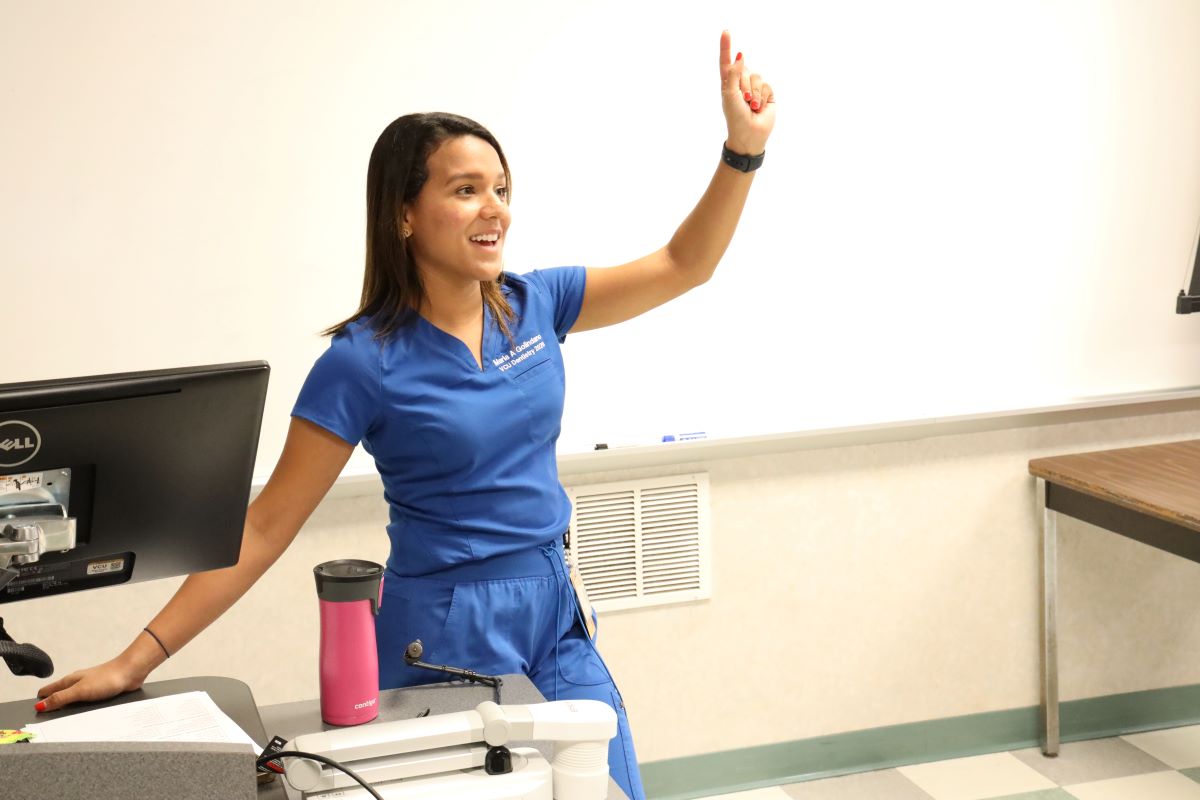
Golindano put her experience on display as the instructor of the first basics course in September.
“I am trying to give you the basics so you can at least give the commands to your patient so that they are comfortable with you and so that you feel like you don’t need a translator for basic words and phrases like, ‘open your mouth, bite, stand up, sit down or thank you.’ It’s those little things that make a connection for your patient to come back to you, to agree to treatment, to feel more comfortable with you, and to give you that trust,” said Golindano.
Chavez Choque and Golindano will teach a total of eight workshops in the fall and several more in the spring semester that will focus on specific specialities like periodontics and endodontics.
During each workshop, attendees will receive a handout about what will be discussed and the terminology for the lesson. The goal is to build a booklet filled with important terminology that students and dental professionals can use to better communicate with Spanish-speaking patients in the clinic.
“We really want to focus on not only giving terms, but also emphasizing the kind of empathy you should have,” said Chavez Choque.
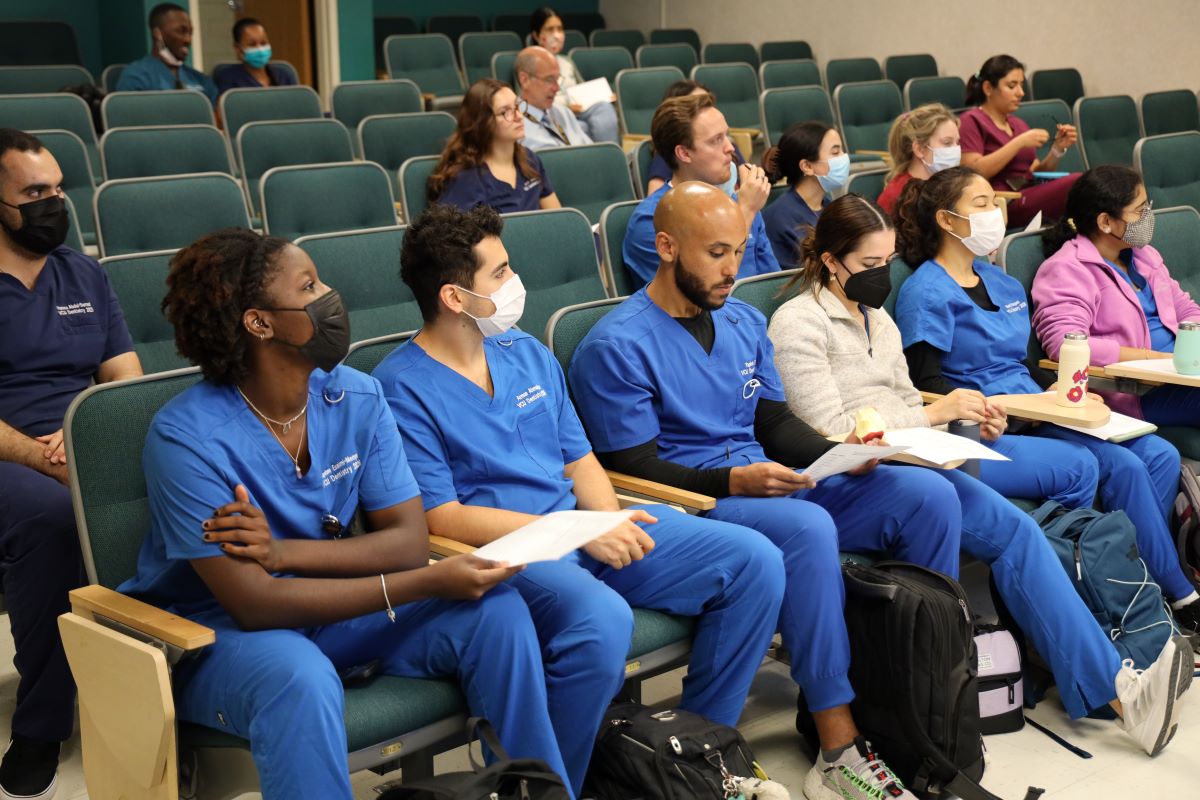
During Hispanic and Latinx Heritage Month, the HSDA has several other important events including the Hispanic/Latinx Heritage Month Guest Speaker Series, which will highlight the accomplishments of Hispanic/Latinx professionals and their contributions to the field of dentistry.
On Oct. 6, School of Dentistry faculty Ana Andrada, D.D.S., and Luciano Andrada, D.D.S., M.M.Sc., will share their journey in dentistry and experiences in providing care for the Hispanic/Latinx community in the region.
“If you want to become a more culturally competent clinician, you need to be open minded and hear other perspectives, and I think bringing different speakers for Hispanic Heritage Month will be very important for students,” said Chavez Choque.
The HSDA is also getting out in the community this fall.
They are participating in the Latinx Community Health Fair in Charlottesville on Oct. 8. HSDA will provide oral health education to the community. They hope to expand their services next year and are working with the Latino Medical Student Association and Collective Corazon to plan a similar event in Richmond in the spring of 2023.
“I think we are slowly working toward a more inclusive and diverse environment so there are many things for which to be grateful. Nevertheless, as an organization, we will always strive for more improvements in the care for the Hispanic/Latinx community,” said Chavez Choque.
Categories Diversity, Equity and Inclusion, Schoolwide News